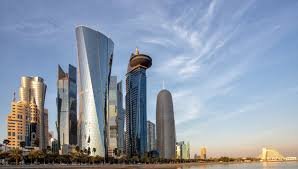How Qatar Became the Richest Country in the World:
Did you know that the richest country in the world lies between Saudi Arabia, Bahrain, and the UAE?
This tiny nation boasts a per capita income of $128,000, higher than the United States, Singapore, and even wealthier Gulf nations like the UAE and Saudi Arabia.
With towering skyscrapers, luxury malls, and an endless parade of supercars, Qatar is often referred to as the “Vegas of the Middle East.”
But Qatar wasn’t always like this.
A few decades ago, it was a dry, barren land plagued by poverty, extreme heat, and little hope.
So, how did such a massive transformation happen?
How did one of the poorest Arab countries rise to become the wealthiest nation on Earth?
The answer lies in a fascinating journey — one that sets Qatar apart from its neighbors.
By the end of this story, you’ll also understand why countries like Saudi Arabia and the UAE have tensions with Qatar and why its future looks even brighter.
The Beginning
It all began in 1916, when Qatar’s ruler at the time, Abdullah Al Thani, signed a treaty with the British Empire.
Under this agreement, Britain promised to protect Qatar from land or sea invasions, and in return, Qatar would become a British protectorate for the next 25 years.
All natural resources extracted from Qatari soil or waters would involve British interests.
Discovery of Oil
In 1940, the first oil field was discovered in Qatar.
Over the next 20 years, exploration and production continued, slowly improving the country’s economy.
However, the real game changer hadn’t happened yet.
1977: The Hidden Treasure
In 1977, Shell Oil discovered the North Field — the world’s largest natural gas reserve, shared between Qatar and Iran.
At the time, natural gas was not considered a valuable commodity like oil because it could only be transported through pipelines.
And since Qatar was too far from gas-consuming countries, Shell abandoned the idea of gas export.
1971: Independence
Qatar gained independence from Britain in 1971, but for the next few years, not much changed economically or politically.
1995: A Turning Point
In 1995, Crown Prince Hamad bin Khalifa Al Thani deposed his father in a bloodless coup and became the Emir.
He had one focus: natural gas.
He invested in modern liquefaction technology, which converts gas into a liquid (LNG) so it can be shipped worldwide like oil.
Though expensive and risky, this move paid off big time.
Today, Qatar is the largest exporter of Liquefied Natural Gas (LNG) in the world.
Billions in Revenue
Qatar exports LNG to countries like Japan, South Korea, China, India, and Spain — generating tens of billions of dollars annually.
But earning money is just half the story.
The real success lies in how Qatar has used that income.
Wise Investments Worldwide
In 2005, Qatar launched the Qatar Investment Authority (QIA) to invest the surplus from oil and gas in global assets.
Today, QIA owns stakes in:
- High-end hotels in London
- Shares in Volkswagen
- Barclays Bank
- Tiffany & Co
- Russia’s largest oil firm
- And several U.S. companies
These investments not only diversify income but also shield Qatar’s economy from oil and gas dependency.
Diversifying Its Economy
Qatar’s efforts didn’t stop at gas and foreign investments.
Hosting the 2022 FIFA World Cup was part of a larger vision to put Qatar on the global map.
Massive spending on infrastructure, state-of-the-art stadiums, and tourism made this possible.
Building Soft Power — Al Jazeera
Qatar launched the news network Al Jazeera, which has become the most influential media voice in the Arab world.
During the 2010 Arab Spring, Al Jazeera was the only outlet covering the uprisings.
This angered neighboring countries, especially Saudi Arabia and the UAE, who accused Qatar of meddling in internal affairs.
In 2017, they cut diplomatic ties and imposed a blockade, demanding Al Jazeera’s shutdown.
But Qatar stood its ground.
To this day, Al Jazeera remains banned in some Arab nations.
Neutral Diplomacy and Global Respect
Despite the blockade, Kuwait and Oman refused to participate, showing Qatar’s strong diplomatic ties.
It also maintains good relations with Iran and Turkey, making it a neutral and strategic player in the region.
This neutrality has earned Qatar a unique position of trust in global diplomacy.
The Road Ahead
With oil demand expected to decline by 2030 or 2040, many Gulf economies may struggle.
But gas will remain a key energy source for decades.
And as the world transitions to cleaner fuels, Qatar’s gas empire will remain a powerful asset.
Conclusion: How Qatar Became the Richest Country in the World
From a poor desert state to a global energy and investment powerhouse, Qatar’s rise is nothing short of remarkable.
It’s not just wealth — it’s vision, strategy, and bold decisions that shaped Qatar into the rich nation we see today.




